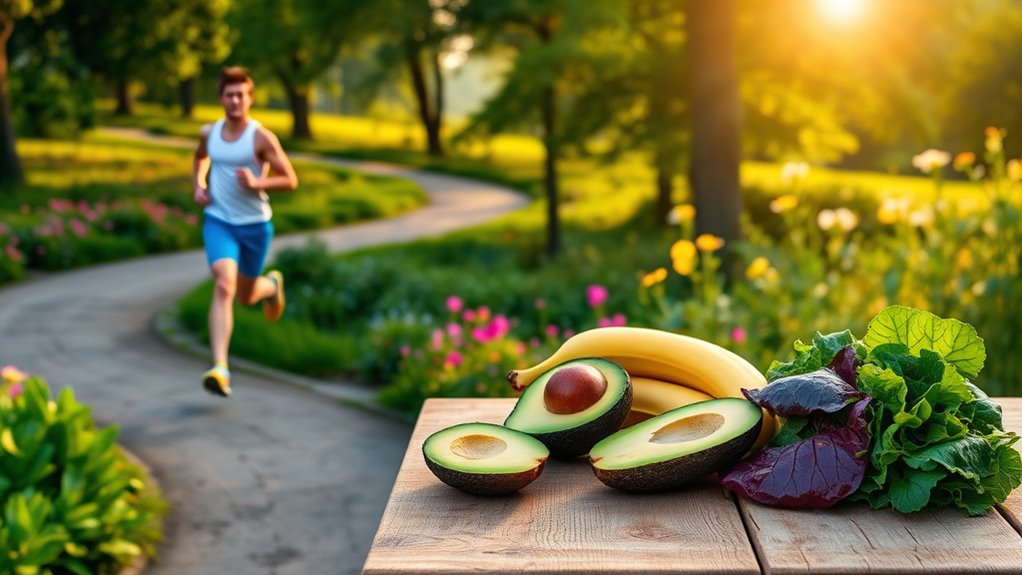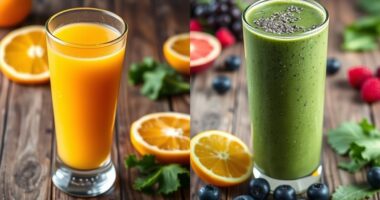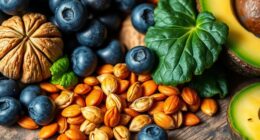In your first week of a plant-powered marathon plan, focus on building a routine with nutrient-dense foods like colorful fruits, veggies, whole grains, nuts, and legumes to boost energy and recovery. Prioritize hydration and consume simple, easily digestible snacks before runs, such as bananas or oatmeal. After workouts, replenish with plant-based carbs, proteins, and healthy fats, and consider targeted supplements like algae-based omega-3s and B12 to support your goals. Keep exploring to uncover more tips for a successful start.
Key Takeaways
- Focus on nutrient-dense, plant-based foods like fruits, vegetables, whole grains, beans, nuts, and seeds to support energy and recovery.
- Incorporate easily digestible pre-run snacks such as bananas with almond butter or oatmeal with berries for optimal performance.
- Post-run, replenish glycogen with complex carbs and support muscle repair using plant-based proteins like quinoa and legumes.
- Use algae-based supplements (spirulina, chlorella) and vegan protein powders to meet nutritional needs during the diet transition.
- Build a sustainable routine by listening to your body, tracking responses, and gradually establishing consistent fueling and hydration strategies.

Starting on a marathon journey with a plant-powered diet is an empowering choice that can boost your endurance and recovery. In the first week of your training plan, focusing on proper running nutrition sets a strong foundation for your progress. You want your body to get the right fuel from plant-based sources, which means incorporating a variety of nutrient-dense foods that support energy levels and muscle recovery. Think colorful fruits and vegetables, whole grains, nuts, seeds, and legumes—these form the core of your plant-based diet and supply essential vitamins, minerals, and antioxidants. Hydration is equally important, so drink plenty of water throughout the day, especially around your runs, to stay well-hydrated and prevent fatigue.
Kickstart your marathon with nutrient-rich plant foods and proper hydration for optimal energy and recovery.
When it comes to running nutrition during your training, timing is key. Before your runs, opt for easily digestible snacks like a banana with almond butter or a small bowl of oatmeal topped with berries. These provide quick energy without causing stomach discomfort. After your runs, prioritize replenishing glycogen stores and repairing muscles by consuming a balanced meal rich in complex carbs, plant-based protein, and healthy fats. Examples include a quinoa and black bean salad or a smoothie with spinach, frozen berries, chia seeds, and plant-based protein powder. These meals help sustain your energy and promote faster recovery.
Plant-based supplements can be a helpful addition during Week 1, especially if you’re transitioning to a plant-powered diet. Consider adding options like spirulina or chlorella, which are nutrient-dense algae that can boost your iron and B12 levels, supporting overall energy. Vegan protein powders can help ensure you’re meeting your daily protein needs, particularly post-run, to support muscle repair. Omega-3 supplements derived from algae provide anti-inflammatory benefits and aid in recovery, so including these can help reduce soreness and inflammation. Always check labels to select high-quality, minimally processed supplements to maximize benefits without unnecessary additives.
In this initial phase, listen closely to your body’s signals. Adjust your intake if you feel sluggish or overly full. Remember, your goal is to build a sustainable routine that energizes you and enhances your training. Incorporating specialized equipment like proper hydration gear and comfortable running shoes can make a significant difference in your training experience. Incorporate small, consistent changes, and keep track of how your body responds to different foods and supplements. This week is about establishing habits—fueling wisely, staying hydrated, and giving your body the nutrients it needs to handle increased mileage. By focusing on good running nutrition and smart use of plant-based supplements, you’re setting yourself up for a successful marathon training journey that’s healthy, sustainable, and energizing.
Frequently Asked Questions
How Should I Adjust My Plant-Based Diet for Longer Runs?
For longer runs, you should adjust your plant-based diet by increasing your intake of meat alternatives like tofu and tempeh to boost protein and energy levels. Stay hydrated by practicing hydration strategies, such as drinking water and electrolyte drinks before and during your run. Consider adding easily digestible carbs like bananas or energy gels. These adjustments help maintain your energy, prevent fatigue, and keep you fueled throughout your marathon.
What Are Best Plant Sources of Quick Energy Before a Run?
For quick energy before a run, you should choose snacks for runners that are rich in easily digestible carbs. Opt for plant sources like bananas, dates, and dried fruit, which provide natural sugars and quick energy. Make sure to stay pre run hydrated with water or coconut water. These choices boost your energy and hydration levels, helping you perform your best during longer runs.
How Can I Prevent Nutritional Deficiencies on a Plant-Based Marathon Plan?
To prevent nutritional deficiencies on your plant-based marathon plan, you should include a variety of foods. Prioritize vegan protein sources like lentils, chickpeas, and tofu to meet your needs. Additionally, consume iron-rich foods such as spinach, quinoa, and fortified cereals to avoid iron deficiency. Make sure to balance your diet with colorful fruits and vegetables, and consider supplements if needed. Stay consistent to support your training and overall health.
What Should I Eat Post-Run to Optimize Recovery?
Your post-run recovery is vital, and you’ll want to fuel your body like a superhero! Focus on ideal protein pairing, combining plant-based proteins like beans and quinoa to boost muscle repair. Don’t forget hydration strategies—replenish lost fluids with water and electrolyte-rich drinks. Eating a balanced meal with carbs and healthy fats also helps restore energy. This powerful combo accelerates recovery and keeps you marathon-ready, every step of the way.
Are There Specific Supplements Recommended for Plant-Based Marathoners?
You should consider plant-based protein sources like beans, lentils, and tofu to support your recovery. Iron supplementation can also help prevent deficiencies, especially if you’re prone to low iron levels, which are common among plant-based athletes. Make sure to choose plant-based iron sources like spinach or fortified cereals, and consult a healthcare professional to determine if supplements are necessary for your marathon training.
Conclusion
By following this plant-powered marathon plan, you’re not just training—you’re revealing superhuman endurance levels you never knew existed. Each stride will feel like you’re gliding on air, powered by nature’s most potent fuel. Before you know it, you’ll be breaking records, leaving ordinary runners in the dust, and transforming into a marathon legend. This isn’t just training; it’s the beginning of your unstoppable, plant-fueled journey to greatness!










